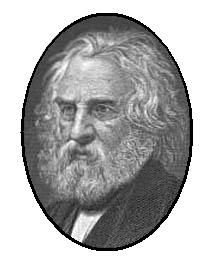Poetry Lovers' Page:
featuring complete collections of poems by the following poets:
Rudyard Kipling
Edgar Allan Poe
Robert Louis Stevenson
featuring complete collections of poems by the following poets:
Rudyard Kipling
Edgar Allan Poe
Robert Louis Stevenson
You are here: Home » British/American Poets » Henry Wadsworth Longfellow » The Sailing Of the Mayflower
V.
You are here: Home » British/American Poets » Henry Wadsworth Longfellow » The Sailing Of the Mayflower
The Sailing Of the Mayflower
From The Courtship Of Miles StandishV.
Just in the gray of the dawn, as the mists uprose from the meadows, There was a stir and a sound in the slumbering village of Plymouth; Clanging and clicking of arms, and the order imperative, "Forward!" Given in tone suppressed, a tramp of feet, and then silence. Figures ten, in the mist, marched slowly out of the village. Standish the stalwart it was, with eight of his valorous army, Led by their Indian guide, by Hobomok, friend of the white men, Northward marching to quell the sudden revolt of the savage. Giants they seemed in the mist, or the mighty men of King David; Giants in heart they were, who believed in God and the Bible,-- Ay, who believed in the smiting of Midianites and Philistines. Over them gleamed far off the crimson banners of morning; Under them loud on the sands, the serried billows, advancing, Fired along the line, and in regular order retreated. Many a mile had they marched, when at length the village of Plymouth Woke from its sleep, and arose, intent on its manifold labors. Sweet was the air and soft; and slowly the smoke from the chimneys Rose over roofs of thatch, and pointed steadily eastward; Men came forth from the doors, and paused and talked of the weather, Said that the wind had changed, and was blowing fair for the Mayflower; Talked of their Captain's departure, and all the dangers that menaced, He being gone, the town, and what should be done in his absence. Merrily sang the birds, and the tender voices of women Consecrated with hymns the common cares of the household. Out of the sea rose the sun, and the billows rejoiced at his coming; Beautiful were his feet on the purple tops of the mountains; Beautiful on the sails of the Mayflower riding at anchor, Battered and blackened and worn by all the storms of the winter. Loosely against her masts was hanging and flapping her canvas, Rent by so many gales, and patched by the hands of the sailors. Suddenly from her side, as the sun rose over the ocean, Darted a puff of smoke, and floated seaward; anon rang Loud over field and forest the cannon's roar, and the echoes Heard and repeated the sound, the signal-gun of departure! Ah! but with louder echoes replied the hearts of the people! Meekly, in voices subdued, the chapter was read from the Bible, Meekly the prayer was begun, but ended in fervent entreaty! Then from their houses in haste came forth the Pilgrims of Plymouth, Men and women and children, all hurrying down to the sea-shore, Eager, with tearful eyes, to say farewell to the Mayflower, Homeward bound o'er the sea, and leaving them here in the desert. Foremost among them was Alden. All night he had lain without slumber, Turning and tossing about in the heat and unrest of his fever. He had beheld Miles Standish, who came back late from the council, Stalking into the room, and heard him mutter and murmur, Sometimes it seemed a prayer, and sometimes it sounded like swearing. Once he had come to the bed, and stood there a moment in silence; Then he had turned away, and said: "I will not awake him; Let him sleep on, it is best; for what is the use of more talking!" Then he extinguished the light, and threw himself down on his pallet, Dressed as he was, and ready to start at the break of the morning,-- Covered himself with the cloak he had worn in his campaigns in Flanders,-- Slept as a soldier sleeps in his bivouac, ready for action. But with the dawn he arose; in the twilight Alden beheld him Put on his corselet of steel, and all the rest of his armor, Buckle about his waist his trusty blade of Damascus, Take from the corner his musket, and so stride out of the chamber. Often the heart of the youth had burned and yearned to embrace him, Often his lips had essayed to speak, imploring for pardon; All the old friendship came back, with its tender and grateful emotions; But his pride overmastered the nobler nature within him,-- Pride, and the sense of his wrong, and the burning fire of the insult. So he beheld his friend departing in anger, but spake not, Saw him go forth to danger, perhaps to death, and he spake not! Then he arose from his bed, and heard what the people were saying, Joined in the talk at the door, with Stephen and Richard and Gilbert, Joined in the morning prayer, and in the reading of Scripture, And, with the others, in haste went hurrying down to the sea-shore, Down to the Plymouth Rock, that had been to their feet as a door-step Into a world unknown,--the corner-stone of a nation! There with his boat was the Master, already a little impatient Lest he should lose the tide, or the wind might shift to the eastward, Square-built, hearty, and strong, with an odor of ocean about him, Speaking with this one and that, and cramming letters and parcels Into his pockets capacious, and messages mingled together Into his narrow brain, till at last he was wholly bewildered. Nearer the boat stood Alden, with one foot placed on the gunwale, One still firm on the rock, and talking at times with the sailors, Seated erect on the thwarts, all ready and eager for starting. He too was eager to go, and thus put an end to his anguish, Thinking to fly from despair, that swifter than keel is or canvas, Thinking to drown in the sea the ghost that would rise and pursue him. But as he gazed on the crowd, he beheld the form of Priscilla Standing dejected among them, unconscious of all that was passing. Fixed were her eyes upon his, as if she divined his intention, Fixed with a look so sad, so reproachful, imploring, and patient, That with a sudden revulsion his heart recoiled from its purpose, As from the verge of a crag, where one step more is destruction. Strange is the heart of man, with its quick, mysterious instincts! Strange is the life of man, and fatal or fated are moments, Whereupon turn, as on hinges, the gates of the wall adamantine! "Here I remain!" he exclaimed, as he looked at the heavens above him, Thanking the Lord whose breath had scattered the mist and the madness, Wherein, blind and lost, to death he was staggering headlong. "Yonder snow-white cloud, that floats in the ether above me, Seems like a hand that is pointing and beckoning over the ocean. There is another hand, that is not so spectral and ghost-like, Holding me, drawing me back, and clasping mine for protection. Float, O hand of cloud, and vanish away in the ether! Roll thyself up like a fist, to threaten and daunt me; I heed not Either your warning or menace, or any omen of evil! There is no land so sacred, no air so pure and so wholesome, As is the air she breathes, and the soil that is pressed by her footsteps. Here for her sake will I stay, and like an invisible presence Hover around her for ever, protecting, supporting her weakness; Yes! as my foot was the first that stepped on this rock at the landing, So, with the blessing of God, shall it be the last at the leaving!" Meanwhile the Master alert, but with dignified air and important, Scanning with watchful eye the tide and the wind and the weather, Walked about on the sands; and the people crowded around him Saying a few last words, and enforcing his careful remembrance. Then, taking each by the hand, as if he were grasping a tiller, Into the boat he sprang, and in haste shoved off to his vessel, Glad in his heart to get rid of all this worry and flurry, Glad to be gone from a land of sand and sickness and sorrow, Short allowance of victual, and plenty of nothing but Gospel! Lost in the sound of the oars was the last farewell of the Pilgrims. O strong hearts and true! not one went back in the Mayflower! No, not one looked back, who had set his hand to this ploughing! Soon were heard on board the shouts and songs of the sailors Heaving the windlass round, and hoisting the ponderous anchor. Then the yards were braced, and all sails set to the west-wind, Blowing steady and strong; and the Mayflower sailed from the harbor, Rounded the point of the Gurnet, and leaving far to the southward Island and cape of sand, and the Field of the First Encounter, Took the wind on her quarter, and stood for the open Atlantic, Borne on the send of the sea, and the swelling hearts of the Pilgrims. Long in silence they watched the receding sail of the vessel, Much endeared to them all, as something living and human; Then, as if filled with the spirit, and wrapt in a vision prophetic, Baring his hoary head, the excellent Elder of Plymouth Said, "Let us pray!" and they prayed, and thanked the Lord and took courage. Mournfully sobbed the waves at the base of the rock, and above them Bowed and whispered the wheat on the hill of death, and their kindred Seemed to awake in their graves, and to join in the prayer that they uttered. Sun-illumined and white, on the eastern verge of the ocean Gleamed the departing sail, like a marble slab in a graveyard; Buried beneath it lay for ever all hope of escaping. Lo! as they turned to depart, they saw the form of an Indian, Watching them from the hill; but while they spake with each other, Pointing with outstretched hands, and saying, "Look!" he had vanished. So they returned to their homes; but Alden lingered a little, Musing alone on the shore, and watching the wash of the billows Round the base of the rock, and the sparkle and flash of the sunshine, Like the spirit of God, moving visibly over the waters.
You are here: Home » British/American Poets » Henry Wadsworth Longfellow » The Sailing Of the Mayflower
Copyright © 1995-2020 poetryloverspage.com. All rights reserved.



